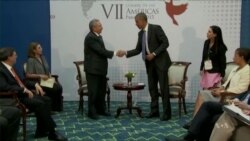The United States' official removal of Cuba from its list of state sponsors of terrorism is being celebrated on the communist island and welcomed by many Americans.
The move Friday brings the two Cold War adversaries a step closer to re-establishing diplomatic relations that were severed more than 50 years ago.
The United States, in announcing the decision, siad it is effective immediately. For many Cubans the decision means righting a longtime injustice.
"We have always fought for peace, for solidarity. It was an injustice to put us on this list. Now, there is justice," one woman said.
Another Cuban said, "Cuba has always been affected by terrorism - not to sponsor, not to put bombs anywhere - therefore, it does not deserve to be on the list."
A young woman said, "Luckily, they realized - they opened their eyes - that we are not bad."
Cuba was placed on the list in 1982 for aiding rebel movements in Africa and Latin America. But Havana long ago said it had ceased supporting foreign insurgencies.
Key condition
Cuban President Raul Castro made the removal a key condition for restoring diplomatic relations with Washington. Some U.S. lawmakers oppose rapprochement with the communist country.
U.S. Senator Marco Rubio of Florida said Friday, "It is a victory for the oppressive Cuban government, but a serious setback for the oppressed Cuban people."
But after several meetings with U.S. officials, Cuba's government in March allowed the launch of the island's first known free, public Internet service at a Havana cultural center.
"Hopefully the cost of communications in Cuba will go down thanks to these new doors opening (with the U.S.) and that will permit this country to do many more things," said Alexis Leyva, a Cuban artist.
The ease of travel restrictions has enabled reunions of family members separated for many years and it has enabled this American artist to participate in an international art festival in Havana.
Duke Riley's creation consisted of releasing 500 pigeons with lights strapped to their feet.





